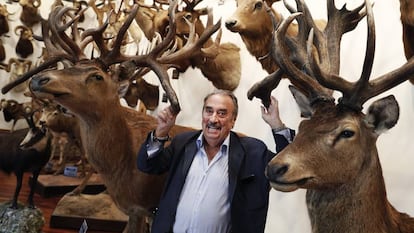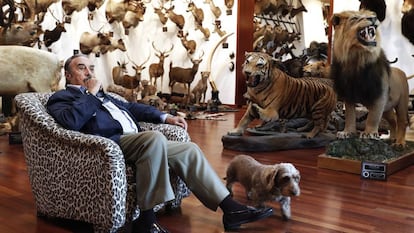Spanish entrepreneur’s dream of a hunting museum turns into a nightmare
Police seize 49 taxidermy mounts and 132 ivory pieces from the luxury home of Marcial Gómez Sequeira, who was investigated after EL PAÍS ran a story in 2019

The entrepreneur Marcial Gómez Sequeira had a dream: to open up the world’s largest hunting museum in a village in rural Spain. But now he’s caught up in a nightmare instead – it does not look like his museum is going to open any time soon, and the police have just seized 49 of his taxidermy mounts as well as 132 ivory pieces.
These recent events were triggered by an article published by EL PAÍS in October 2019, when the former chairman and son of one of the founders of the health insurance giant Sanitas opened up his luxury home to a reporter and revealed 1,250 stuffed animals that he had personally killed in over 48 years of big-game hunting. The trophies included lions, leopards, a polar bear and a white rhinoceros caught all over the globe.
A police investigation ensued, and Gómez Sequeira was unable to produce the legal paperwork for 49 of his trophies, which were confiscated and transferred to the National Museum of Natural Science in Madrid. “I’m not making any statements; if there’s a trial everything will be said there, I don’t want to say anything,” replied Sequeira to a call from this newspaper.
The 81-year-old businessman headed the private health insurance giant Sanitas until 1988, when he sold his shares for the equivalent of €130 million to the British private healthcare group BUPA. In the 2019 interview, he declared himself to be an unapologetic admirer of dictator Francisco Franco, and revealed details of his deal with authorities in the western region of Extremadura – which is run by the Socialist Party (PSOE) – to open up a museum bearing his name in the small town of Olivenza. Following the publication of the feature, the mayor of Olivenza, also of the PSOE, declared that he was withdrawing support for the museum.

Two years ago, Gómez Sequeira decided to take the vast collection out of his house in La Moraleja, Madrid’s wealthiest neighborhood, to make sure his daughters would not have to deal with any related issues when he passed away. He got in touch with the regional premier of Extremadura, Guillermo Fernández Vara, whom the businessman described as a distant relative of his, and a preliminary deal was reached to house 1,250 items of the collection inside Olivenza’s Cavalry Barracks, a large 18th-century building suitable for a museum of that scope. Under the deal, the regional government would also invest in a project expected to draw tourism to one of Spain’s most economically depressed regions.
But the newspaper article drew the attention of the police, which ultimately opened an investigation into the alleged trafficking of protected species. Some of the most singular specimens inside the house included a black impala and an African golden cat. A police department specializing in crimes involving protected species found that the businessman lacked the necessary import and handling documents for some of the specimens in his large collection.
The entrepreneur has said in his own defense that some of the animals were acquired before the CITES global convention on the trade of endangered species went into effect in 1975. Following a year-long process, Gómez Sequeira has been unable to prove the legal origin of 49 taxidermy mounts, four elephant tusks, four hippopotamus canines, two rhinoceros horns and 132 carved ivory pieces.
Tu suscripción se está usando en otro dispositivo
¿Quieres añadir otro usuario a tu suscripción?
Si continúas leyendo en este dispositivo, no se podrá leer en el otro.
FlechaTu suscripción se está usando en otro dispositivo y solo puedes acceder a EL PAÍS desde un dispositivo a la vez.
Si quieres compartir tu cuenta, cambia tu suscripción a la modalidad Premium, así podrás añadir otro usuario. Cada uno accederá con su propia cuenta de email, lo que os permitirá personalizar vuestra experiencia en EL PAÍS.
¿Tienes una suscripción de empresa? Accede aquí para contratar más cuentas.
En el caso de no saber quién está usando tu cuenta, te recomendamos cambiar tu contraseña aquí.
Si decides continuar compartiendo tu cuenta, este mensaje se mostrará en tu dispositivo y en el de la otra persona que está usando tu cuenta de forma indefinida, afectando a tu experiencia de lectura. Puedes consultar aquí los términos y condiciones de la suscripción digital.








































